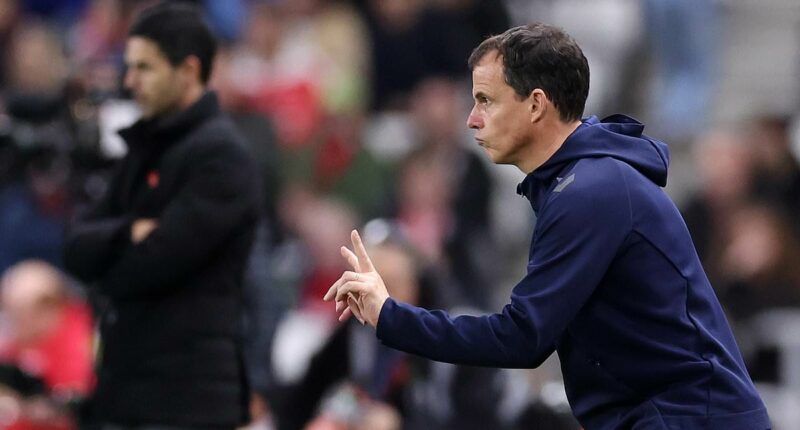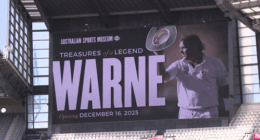Share this @internewscast.com
Regis Le Bris’s sly grin said it all. Following Sunderland’s 2-2 draw with Arsenal on Saturday, he was questioned about the positioning of the team’s advertising boards, which seemed closer to the pitch than usual.
“Are you sure?” Le Bris responded, a mischievous smile playing on his lips. “It must have been the wind,” a colleague chimed in, and Le Bris nodded in agreement.
For anyone other than the most literal-minded, this explanation was hardly convincing. It’s more plausible that Sunderland moved the boards to hinder Declan Rice’s long throws—and it appeared to be effective.
This tactic isn’t new. West Ham employed a similar strategy against Stoke City’s long-throw specialist Rory Delap in 2010, although it backfired when a misplaced throw led to a goal by Ricardo Fuller.
Nevertheless, such stories haven’t deterred teams from seeking any possible edge over their rivals.

Sunderland seemingly moved their advertising hoardings closer to the pitch to Arsenal’s long throws on Saturday

Sunderland equalised in stoppage time thanks to Brian Brobbey to break Arsenal’s winning run
Moving the goalposts
For example, consider the audacious tactics some goalkeepers have used: literally making the goals seem smaller.
And no, we’re not talking about shifting your jumpers closer together at the park. This has happened in professional football.
In 2009, IFK Gothenburg stopper Kim Christensen was seen moving the bottom of the woodwork with his feet before a match against Orebro in Sweden’s top flight.
Fortunately the referee figured that the posts were narrower than the required eight-yard width, but, unlike some bemused fans, he didn’t clock that Christensen was culpable.
‘I got the tip from a goalkeeping friend a few years ago, and since then I have done it from time to time,’ he admitted.
In 2022, Patrik Gunnarsson, a custodian for Norwegian outfit Viking, did the same.
Newspaper Aftenposten shared a clip of him shifting the posts moments after the assistant referee had checked the area. Sneaky.
‘It’s just a ritual I have before the matches which makes me feel comfortable,’ he explained, fooling nobody. ‘It’s no more than that. I just kick the bars a little.’

Some goalkeepers, including Patrik Gunnarsson, have been known to shift the goalposts
Norwich’s testosterone-killing dressing room
In the 2018-19 season, Norwich had an innovative idea backed by scientific theory: let’s paint the away dressing room ‘deep pink’.
The colour is thought to lower testosterone levels and have a calming effect, with the idea being that it would translate to a less explosive performance on the pitch from the visitors.
‘Pink has an effect, not because it is pink, but because it’s linked to childhood experiences,’ said Dr Alexander Latinjak, a lecturer in sport psychology at the University of Suffolk. ‘If it is true that pink lowers testosterone levels, then the coach should know exactly how to use that advantage tactically.’
Did it work? Well, Norwich won the Championship that season, a drastic improvement on their 14th-placed finish the campaign before. They also picked up 49 points at home, up from 32. What impact the pink had is hard to calculate.
What we do know is that the The Canaries ditched the pink for the Premier League, so they obviously didn’t think too much of it.
Maybe that explains why they finished bottom of the top flight with 15 points accrued at home in 2019-20.
Former Norwich goalkeeper Tim Krul didn’t feel it helped much. ‘No, I don’t think it had much of an impact,’ he told The Athletic.
‘You can see it both ways. You don’t want to give another team fire in the belly to go “Look at these trying to play games” already before it even started. So, it’s a fine balance.’

Norwich painted their away dressing room pink in 2018-19 to lower their rivals’ testosterone
‘Modifying’ the pitch
John Beck is widely considered to be the best manager in Cambridge United’s history after leading them from the fourth tier to the brink of the Premier League in the 1980s and ’90s.
To help their direct style of play, Beck instructed the grounds staff to let the grass grow long in the corners so the ball would sit up – all the better for punting a cross into the box.
They would also hold training sessions in the middle of the pitch to churn up the turf and thereby stop their more elegant-minded opponents from imposing their style.
But it didn’t stop there. Cambridge would also turn up the heat in the away dressing room, load all the teas with sugar, and leave their opposition’s warm-up balls to soak in the bath.
Even the home stars couldn’t escape Beck’s unorthodox antics. He liked chucking buckets of ice-cold water over his men to wake them up ahead of kick-off. Perhaps that strategy wouldn’t be appreciated by Chelsea star Estevao Willian, who is apparently finding the English cold tricky to cope with.
‘Every single thing you’ve heard from that time was true,’ Dion Dublin told the Cambridge News in 2017.
‘We were a horrible team to play against. Playing at the Abbey Stadium was so uncomfortable for other teams.’
Unfortunately, they lost in the play-off semi-finals against Leicester in 1992 to be denied a third successive promotion, went down the season after, and have never been in the second tier since.

John Beck left the grass long to assist with Cambridge’s direct play – and muddied the middle of the park to disrupt other teams trying to playing short
Freezing showers
Alright, alright. We can’t confirm this one. But even the mere suspicion of it being deliberate would get in your head.
Arsenal caused a stir recently when it emerged that the showers in the away dressing room for Atletico Madrid’s training evening were as cold as winter.
As a result, Atletico opted to get on the team bus in their dirty kits – it had rained during their session – and drive back to the comfort of their heated hotel showers.
Diego Simeone’s side were so incensed that they lodged a formal complaint to UEFA. Clearly they thought it was no coincidence.
Arsenal have protested their innocence and claim the malfunction affected both dressing rooms, being solved shortly after the Spanish side left.
It wouldn’t have been an issue for the home side anyway, as they weren’t there at the time.
Under the official rules set out by UEFA, teams must provide hot showers but that is limited to matchdays and the infrastructure regulations do not extend to training sessions so it seems unlikely that the north London club will be punished.
Was it another ‘dark arts’ trick from Mikel Arteta? An innocent accident. Perhaps we’ll never know. Either way, it got in Atletico’s heads. Arsenal battered them 4-0.

Atletico Madrid were irate that their showers were cold when they trained at the Emirates earlier this season – but did Arsenal do that on purpose?

Jose Mourinho has allegedly left the grass uncut for when Pep Guardiola comes to town to mess up his passing football
And many more
There are manifold ways which clubs have used to mess with their opponents – whether explicitly or just from what we suspect.
Jose Mourinho has employed the dark arts to get at Pep Guardiola down the years. Ahead of the 2010 Champions League semi-finals, the grass at the San Siro was kept suspiciously long for the visit of Barcelona, who they beat 3-1, likely in a bid to tamper with the tiki-taka flow of Guardiola’s side.
That tactic carried over to when he was the manager of Real Madrid, when he would again do battle with Guardiola in LaLiga.
Meanwhile, on a snowy day in February 2019, Liverpool only cleared the snow in the half they would be attacking as they prepared for the second period against Leicester City, with the score 1-1 at the break.
Liverpool went on to win 2-1 thanks to a stoppage-time penalty from James Milner and broke no rules leaving their own half as a winter wonderland.
Jurgen Klopp insisted there had merely been a lack of manpower and that it was even an advantage for their opponents.
‘I hear people say it’s unsporting, but it’s an advantage, if their box is clear then it’s better to defend. It’s no coincidence that in the first half we scored a goal in a box that was full of snow. That’s how it is, we cannot change it,’ he said.
Or then there was the time that Graeme Souness ordered Rangers’ pitch to be narrowed for Dynamo Kyiv’s visit in the 1987-88 season, which the Scottish side won 2-1 after restricting their visitors’ influence on the flanks.












